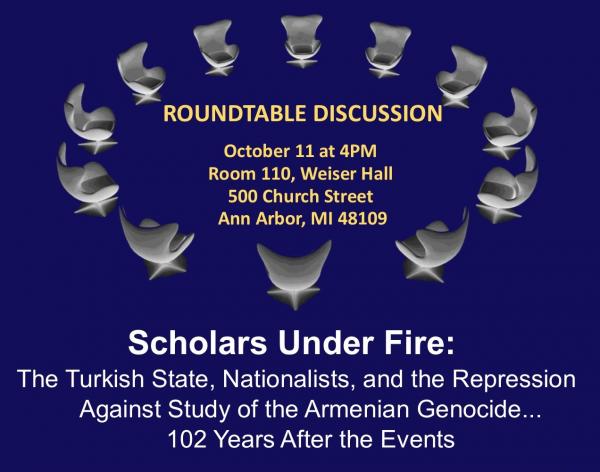Request to co-sponsor an event: In addition to our yearly programming, the Center for Middle Eastern and North African Studies (CMENAS) is happy to consider requests to co-sponsor MENA related U-M lectures, events and activities that coincide with the Center's mission to promote a broad and deep understanding of the region.
Submit your request for co-sponsorship »
ASP Roundtable Discussion | Scholars Under Fire: The Turkish State, Nationalists, and the Repression Against Study of the Armenian Genocide... 102 Years After the Events
Fatma Müge Göçek, Professor of Sociology and Women's Studies, and Ronald Grigor Suny, William H Sewell, Jr Distinguished University Professor of History
Michigan sociologist Fatma Müge Göçek and historian Ronald Grigor Suny have for almost two decades brought Turkish, Armenian, Kurdish, and other scholars together to research, write about, and discuss the massacres and deportations by the Ottoman government of Armenians and Assyrians. The recent conference in Berlin, organized as part of a series of Workshops on Armenian and Turkish Scholarship, was threatened by the right-wing Fatherland Party (Vatan Partisi) and the Turkish government. Scholars from Turkey were prevented from attending; demonstrations against the conference were threatened; and several participants in Turkey came under fire from universities and the state. Professor Göçek and Professor Suny will talk about this threat to academic freedom and censorship that undermines what our university stands for and protects.
WATS was founded in the year 2000 by faculty members from the Armenian Studies Program, Ronald Suny, Kevork Bardakjian, and Gerard Libaridian, as well as UM sociologist, Fatma Müge Göçek. This pioneering venture brought together for the first time a group of scholars of Armenian and Turkish Studies to collectively work on what had long been a forbidden topic, the Armenian Genocide.
WATS proved to be a powerful impetus to a rethinking of the events of 1915, as well as the successful creation of a community of scholars, including Armenians, Kurds, and Turks, who were prepared to acknowledge that a genocide had occurred, were willing to work together to create documentation and a scholarly record of what happened and why, and moved the field of serious Ottoman studies from denial to dealing honestly with the darkest elements of the past. The progress in Armenian and Ottoman studies was enormous, quite unpredictable when the group first met in 2000 in Chicago. Out of the various workshops, held in Chicago, Ann Arbor, Minneapolis, New York City, Salzburg, Amsterdam, and Berkeley, a volume of collected papers appeared: "A Question of Genocide: Armenians and Turks at the End of the Ottoman Empire," edited by Ronald Suny, Fatma Müge Göçek, and Norman Naimark and published by Oxford University Press in 2011. Various members of WATS published their own monographs, among them Ronald Suny's " "They Can Live in the Desert But Nowhere Else": A History of the Armenian Genocide" (Princeton University Press, 2015); and Fatma Müge Göçek's "Denial of Violence: Ottoman Past, Turkish Present and Collective Violence against Armenians, 1789-2009" (Oxford University Press, 2015).
Co-Sponsors: International Institute; Center for Middle Eastern and North African Studies; Department of Sociology; and Conflict and Peace Initiative.
WATS was founded in the year 2000 by faculty members from the Armenian Studies Program, Ronald Suny, Kevork Bardakjian, and Gerard Libaridian, as well as UM sociologist, Fatma Müge Göçek. This pioneering venture brought together for the first time a group of scholars of Armenian and Turkish Studies to collectively work on what had long been a forbidden topic, the Armenian Genocide.
WATS proved to be a powerful impetus to a rethinking of the events of 1915, as well as the successful creation of a community of scholars, including Armenians, Kurds, and Turks, who were prepared to acknowledge that a genocide had occurred, were willing to work together to create documentation and a scholarly record of what happened and why, and moved the field of serious Ottoman studies from denial to dealing honestly with the darkest elements of the past. The progress in Armenian and Ottoman studies was enormous, quite unpredictable when the group first met in 2000 in Chicago. Out of the various workshops, held in Chicago, Ann Arbor, Minneapolis, New York City, Salzburg, Amsterdam, and Berkeley, a volume of collected papers appeared: "A Question of Genocide: Armenians and Turks at the End of the Ottoman Empire," edited by Ronald Suny, Fatma Müge Göçek, and Norman Naimark and published by Oxford University Press in 2011. Various members of WATS published their own monographs, among them Ronald Suny's " "They Can Live in the Desert But Nowhere Else": A History of the Armenian Genocide" (Princeton University Press, 2015); and Fatma Müge Göçek's "Denial of Violence: Ottoman Past, Turkish Present and Collective Violence against Armenians, 1789-2009" (Oxford University Press, 2015).
Co-Sponsors: International Institute; Center for Middle Eastern and North African Studies; Department of Sociology; and Conflict and Peace Initiative.
| Building: | Weiser Hall |
|---|---|
| Event Type: | Lecture / Discussion |
| Tags: | Armenia, Genocide, Middle East Studies, Round Table, Turkey |
| Source: | Happening @ Michigan from Center for Armenian Studies, International Institute, Center for Middle Eastern and North African Studies, Department of Sociology |


